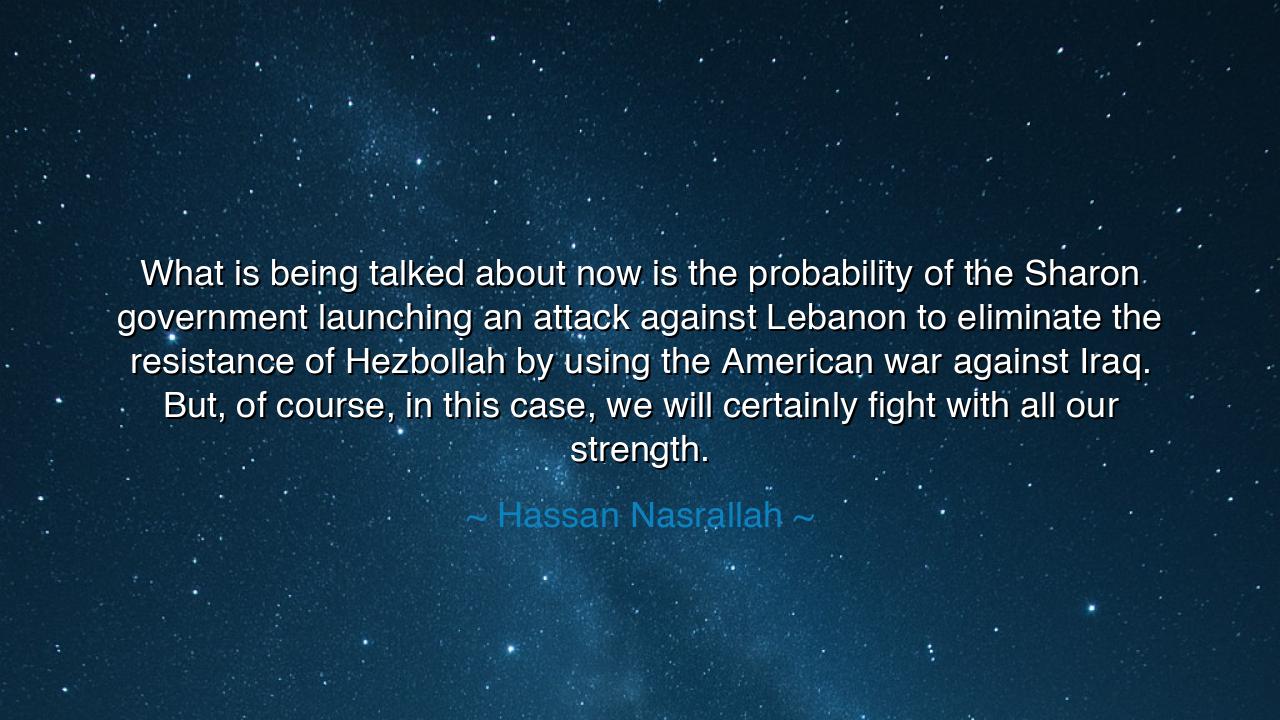
What is being talked about now is the probability of the Sharon
What is being talked about now is the probability of the Sharon government launching an attack against Lebanon to eliminate the resistance of Hezbollah by using the American war against Iraq. But, of course, in this case, we will certainly fight with all our strength.






Hear now a saying carried on the winds of modern strife, a voice from the halls of Lebanon that cries warning and defiance: “What is being talked about now is the probability of the Sharon government launching an attack against Lebanon to eliminate the resistance of Hezbollah by using the American war against Iraq. But, of course, in this case, we will certainly fight with all our strength.” These words are widely attributed to Hassan Nasrallah, the leader of Hezbollah, and they first entered public view amid the tumult of the early 2000s when the Iraq war and regional fears of wider conflict made such threats both plausible and incendiary. (Quotation widely attributed online; see quotation compilations and Nasrallah collections).
To understand the origin of this utterance, one must step into the theatre of its time. In 2003 the Western world watched the American invasion of Iraq, and leaders across the Middle East judged how that war might be used, or abused, by neighbors with longstanding enmities. The name Sharon — Ariel Sharon, Israel’s prime minister at the time — carried with it the memory of past incursions into Lebanon and a fear that regional conflict could be widened while global attention was fixed elsewhere. Scholars and analysts have traced how the 2003 Iraq war reshaped local calculations and emboldened or alarmed different actors across the Levant.
What do these words mean in spirit? At one level they are a simple declaration of deterrence: Nasrallah warns that if Israel—seeing opportunity in an American campaign—moves to strike Lebanese soil to crush Hezbollah, the movement will not succumb quietly but will answer with force. At another level the statement is rhetorical, meant to stiffen resolve at home and to signal to foreign capitals the high cost of aggressive options. It is both a pledge to followers and a warning to adversaries: if you exploit one war to wage another, expect resistance. This is the language of politics in a brittle landscape where symbolism becomes strategy.
History gives us a living example of how such calculations play out. In 2006, after cross-border attacks and the capture of Israeli soldiers, a month-long war erupted between Israel and Hezbollah. Cities were shelled, civilians were uprooted, and both sides claimed victory and lamented ruin. That conflict showed how a spark on the frontier can become a conflagration, how warnings and threats can turn into full-scale exchange, and how the human cost far outweighs any tactical gain. The 2006 war remains a lesson in the peril of military adventurism and the bitter endurance of societies caught between armed actors.
Read temperately, these words teach two complementary truths. First: in a world of overlapping alliances and wars, opportunism can be fatal — a distant war may invite local actors to press their own agendas, and such moves often create wider suffering than planners expect. Second: rhetoric matters. When leaders vow to “fight with all our strength,” they bind themselves to expectations among followers and to the logic of retaliation; escalation becomes not only possible but probable. The ancient prophets warned that words set fires; modern leaders, too, must measure speech against consequence.
From this understanding come ethical lessons for those who would live or lead in such times. First, cherish diplomacy and channels of restraint: where threats are offered, build bridges that lower chances of miscalculation. Second, protect civilians: history shows that wars between armed organizations and states devastate ordinary lives long after the headlines fade. Third, demand accountability of rhetoric: leaders who speak of battle must be held accountable for the human costs their words help produce. These are not novel counsel but the hard wisdom of many winters.
Practically, what should a citizen — or a student of history and policy — do with such a quotation? Read broadly and with skepticism: many modern quotations circulate without clear provenance, so verify sources before amplifying them. Support institutions that protect noncombatants and that foster dialogue across divides. In personal conduct, resist the allure of simple slogans; ask instead what will protect life, preserve dignity, and prevent the multiplication of clouds of war. Finally, insist that policy be guided by prudence rather than pride, by negotiation rather than the temptation to “exploit” another battlefield while a different one rages. (Note: the quotation is widely reproduced in online compilations but primary-speech sourcing is not always available in public archives.)
Thus, as the ancients taught, a statement of war should be read as both a mirror and a warning: it reflects the fears and the strategies of its hour, and it warns us all of the human price of turning regional fragility into wider conflict. May those who read these words choose, with courage and humility, the path that preserves life and opens the door to peace rather than multiplying battlegrounds.






AAdministratorAdministrator
Welcome, honored guests. Please leave a comment, we will respond soon